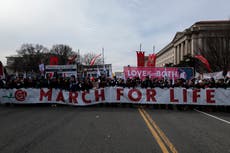Supreme Court justices did not sign sworn affidavits in failed hunt for Dobbs ruling leaker
‘The team has to date been unable to identify a person responsible by a preponderance of the evidence’
Your support helps us to tell the story
From reproductive rights to climate change to Big Tech, The Independent is on the ground when the story is developing. Whether it's investigating the financials of Elon Musk's pro-Trump PAC or producing our latest documentary, 'The A Word', which shines a light on the American women fighting for reproductive rights, we know how important it is to parse out the facts from the messaging.
At such a critical moment in US history, we need reporters on the ground. Your donation allows us to keep sending journalists to speak to both sides of the story.
The Independent is trusted by Americans across the entire political spectrum. And unlike many other quality news outlets, we choose not to lock Americans out of our reporting and analysis with paywalls. We believe quality journalism should be available to everyone, paid for by those who can afford it.
Your support makes all the difference.Supreme Court justices did not sign sworn affidavits as part of a monthslong investigation that failed to determine who leaked a draft version of the court’s decision overturning Roe v Wade to Politico last year.
Gail A Curley, the marshal for the court, revealed that detail in a brief statement on Friday.
“During the course of the investigation, I spoke with each of the Justices, several on multiple occasions,” she wrote. “The Justices actively cooperated in this iterative process, asking questions and answering mine. I followed up on all credible leads, none of which implicated the Justices or their spouses.
“On this basis, I did not believe that it was necessary to ask the Justices to sign sworn affidavits.”
In a statement announcing a lack of developments in the investigation, the court said the leak of Justice Samuel Alito’s draft opinion in Dobbs v Jackson Women’s Health Organization was “one of the worst breaches of trust in its history” and “a grave assault on the judicial process,” but the person who provided the draft to a pair of reporters for the Washington DC-based publication has not yet been identified despite the Marshal’s best efforts.
“The team has to date been unable to identify a person responsible by a preponderance of the evidence,” the court said. “To the extent that additional investigation yields new evidence or leads, the investigators will pursue them. The marshal and her team will continue to have our full support”.
In a statement, former Secretary of Homeland Security Michael Chertoff, who Chief Justice John Roberts engaged as a consultant to review the investigation, said the marshal and her team “undertook a thorough investigation within their legal authorities”.
“Throughout my review, the investigators were transparent, cooperative, and available to answer my questions about the process. At this time, I cannot identify any additional useful investigative measures,” he said.
Mr Chertoff said Chief Justice Roberts has also ordered a “comprehensive review of the Court's information and document security protocols to mitigate the risk of future incidents”.
The 19-page report revealed that the Marshal’s probe determined that it was “unlikely” that the leak was caused by an outside person breaking into the Supreme Court’s IT systems. But on the question of whether someone with legitimate access to the systems was responsible, the report said a technical investigation did not lead to the identification of a suspect.
“After examining the Court’s computer devices, networks, printers, and available call and text logs, investigators have found no forensic evidence indicating who disclosed the draft opinion,” the report said.
During the investigation, the marshal and her aides interviewed 97 people with access to the court’s systems, with some people speaking with investigators more than once for a total of 126 interviews.
“Despite these efforts, investigators have been unable to determine at this time, using a preponderance of the evidence standard, the identity of the person(s) who disclosed the draft majority opinion in Dobbs v. Jackson Women’s Health Org. or how the draft opinion was provided to Politico. Investigators continue to review and process some electronic data that has been collected and a few other inquiries remain pending,” the report said. “To the extent that additional investigation yields new evidence or leads, the investigators will pursue them”.




Join our commenting forum
Join thought-provoking conversations, follow other Independent readers and see their replies
Comments